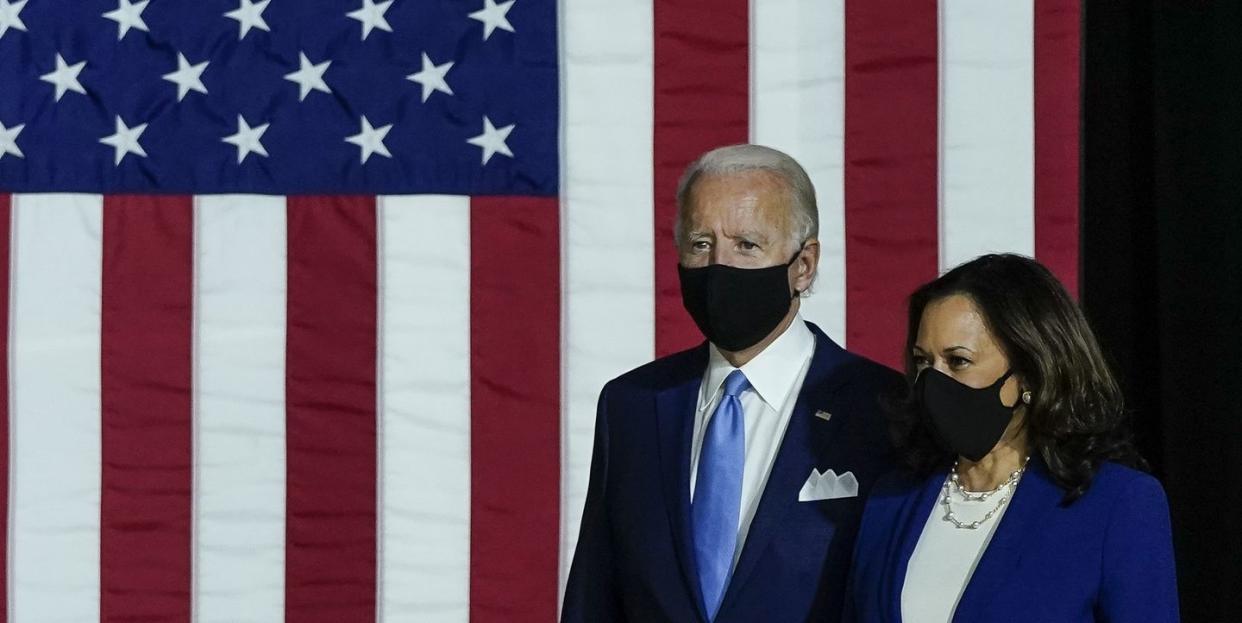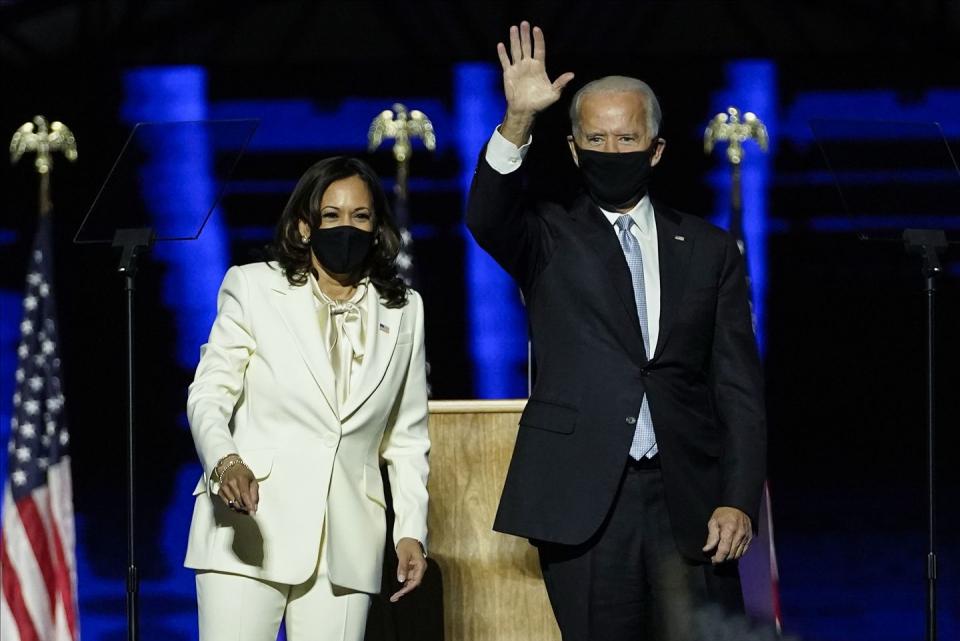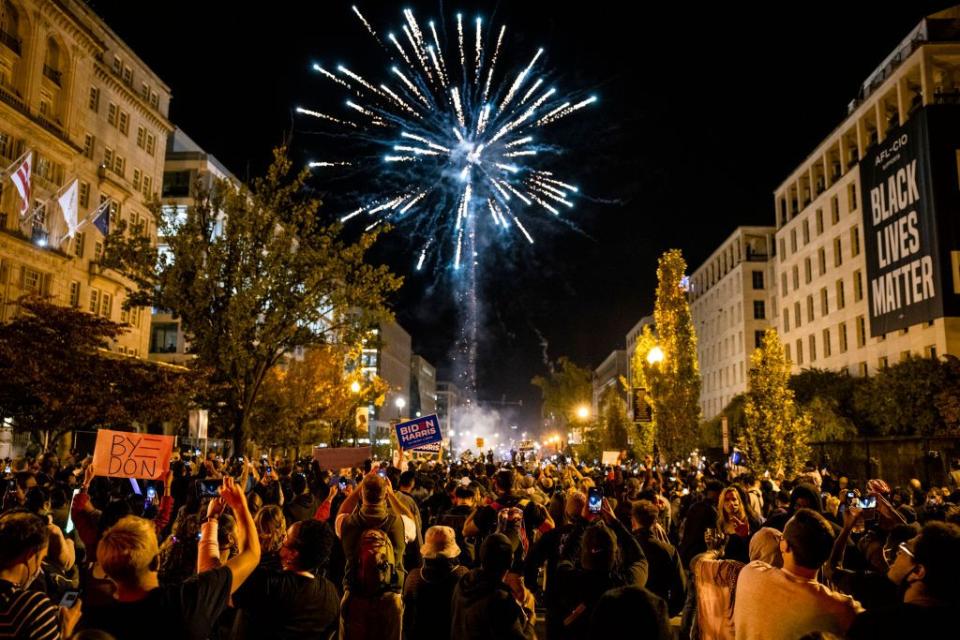What Joe Biden's win really means for women

In an electoral count that went to the wire, Former Vice President Joe Biden has won the US election, making Donald Trump a one term President, and securing for himself (on the third attempt) the seat of power behind the desk of the Oval Office. Making up the majority of the American electorate as they do, it’s women who put him there.
In 2016, it came as a shock that over half of white women in America voted for Donald Trump, in spite of his competitor being the first ever female presidential candidate. Four years on, clearly some of these women have changed their minds. In the pre-election polls Biden led Trump among white suburban women 51% to 44%; 84% of Black women viewed Biden favourably compared with 87% who held unfavourable views about the outgoing president.
Though this time the choice at the top of the ticket was a straight one between two white men in their 70s, a Biden win is as much a vote for the only woman whose name was on the national ballot – Kamala Harris – as it was for the President Elect himself.
Why did women vote the way they did, and what does the result mean for them? According to data intelligence company Morning Consult, ultimately, it’s not women’s rights, equal pay, or even healthcare that swings women’s votes, but the economy, with a third of women claiming that that’s the main priority in their decision-making.

So while President Trump has overseen growth in the economy under his leadership, the effects of COVID-19 can’t be underestimated. The pandemic has disproportionately affected marginalised women in particular, sparking what some have called a ‘she-cession’. A Biden presidency almost certainly means greater direct financial support for women workers, a rise in the federal minimum wage to $15 an hour from its current level of $7.25, as well as universal paid sick days and 12 weeks of paid family and medical leave.
But it’s on women’s rights, particularly abortion, that many will feel hopeful today.
Though President Trump (who once supported abortion rights) had the luxury of filling three vacancies in the Supreme Court with conservative justices – perhaps calling into question the future of Roe vs Wade – many will be optimistic that Biden will reverse some of the actions of the Trump administration.
During the Democratic primary Biden reversed his longtime opposition to using taxpayer money to pay for abortions, and it’s expected he will lift the ban on federally funded family planning clinics referring women for abortions.
More broadly, Biden has promised to work to pass the Equal Rights Amendment, so that women’s rights and gender equality are explicitly enshrined in the Constitution. He has promised to increase transparency over pay in order to address the gender pay gap – and to strengthen enforcement of equal pay. He has pledged to end discrimination against pregnant and nursing workers, and to pass legislation that protects women who report being sexually harassed at work.

For the rest of the world, it’s less President Elect Biden’s domestic policy that matters so much as what his re-election represents. On foreign policy, for example, he has called for an end to US assistance to Saudi Arabia for its war in Yemen, though his stance on how to settle the conflict in Afghanistan, where peace is critical to women’s wellbeing, remains to be seen.
Symbolically, many hoped that Trump’s defeat would be taken to represent an end to the glorification of misogyny. After all, 25 women have made allegations of sexual assault against the President, and he has a track record of denigrating women in the way he speaks and acts.
But Biden’s victory in this election is a numbers one, rather than a moral one, and he himself hasn’t emerged squeaky clean with his track record on women either. Seven women have claimed Biden touched them in a way that made them uncomfortable, and in 2019 a former staff assistant to Biden, Tara Reade, alleged sexual assault.
Dr Christine Blasey Ford’s testimony against Justice Kavanagh in 2018 also reminded many of Biden’s role as chair of the Senate Committee for the Anita Hill hearings in the 1990s. Hill testified that Justice Clarence Thomas had sexually harassed her – and the all-white, all-male committee subjected her to tough questioning that to contemporary eyes can only be seen as sexist. In the light of #ibelieveher, it casts Biden in a bad light, especially given the fact that he has not apologised for ,nor explained, his role.
Nevertheless, for activists and protestors, Biden’s win is a vindication of their efforts over the past four years – of the women’s marches in January 2017, some of the largest demonstrations in US history; of the change in attitudes brought about by #MeToo; of the unprecedented number of women who ran for elected office in the midterms, and the unprecedented number who were elected, people like Ilhan Omar, Ayanna Presley and Alexandria Ocasio-Cortez.

In some ways this victory is bittersweet – four years ago Hillary Clinton was the first woman to run for the Democratic nomination for President. At this election, six women ran for the nomination. Even so, the US electorate still ended up having to choose between two white men.
Joe Biden is not the perfect feminist, and his election win is not a silver bullet for gender equality. But it is a turn in the right direction, if not the sea-change that was hoped for, and with Kamala Harris a prospect for the Presidency in 2024, perhaps the hope of a woman leading from the White House – and a woman of colour at that – is more possible than ever before.
Subscribe to Red now to get the magazine delivered to your door.
Like this article? Sign up to our newsletter to get more articles like this delivered straight to your inbox.
You Might Also Like



